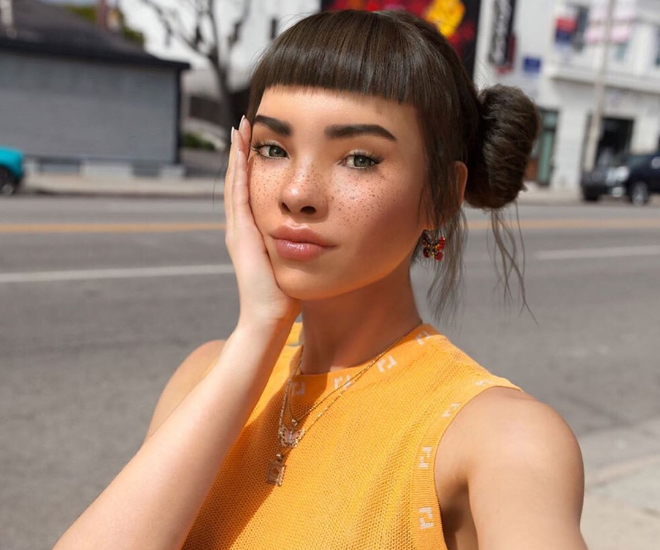

Branded as “the primary Western digital influencer to have achieved international success” Lil Miquela made her debut on Instagram in 2016. Named Miquela Sousa or Lil Miquela, she fascinated many along with her human-like look inflicting many to take a position if she was a advertising and marketing stunt, based mostly on an actual individual, or one thing else completely. Trevor McFedries and Sara DeCou of robotics and AI agency Brud, introduced they have been behind Lil Miquela in 2018. Amassing some 2.7 million followers on Instagram, the self-proclaimed 19-year-old robotic Miquela is maybe the world’s first (and most well-known) AI influencer. She joins a rising development of digital influencers. This yr, Lil Miquela signed with CAA and is projected to earn over USD10 million. As Forbes places in plainly, somebody who doesn’t exist is extra profitable than you. Let that sink in.

Nonetheless regardless of the latest success, some reviews state that Lil Miquela appears to have misplaced her splendor. Her TikTok account has been inactive since November 2022, her YouTube channel hasn’t been up to date in two years, and her Instagram account solely posts thrice a month, with a big drop in fan engagement. LUXUO dissects what introduced on the autumn of the virutal influencer.
The Moral Controversies
Oftentimes, the ethics of those Ai-generated characters come into play. Working example, Shudu Gram. Shudu was a black C.G.I. mannequin created by the white trend photographer Cameron-James Wilson round 2017. By 2019 Shundu had been featured on WWD, Vogue and fronted campaigns for Balmain and Ellesse. Nonetheless, Shudu would later be labelled as a type of “digital blackface” with creator Cameron-James Wilson being closely criticised for profiting off of a Black mannequin’s digital profession. The place Shudu confronted backlash for blackface, Miquela had her justifiable share of controversy of queerbaiting in a 2019 Calvin Klein commercial. Within the video marketing campaign, Miquela shares a kiss with supermodel Bella Hadid inflicting followers to accuse the model of utilizing and sexualising Miquela. That very same yr Miquela confronted on-line backlash after releasing a vlog during which she talked about her “expertise” with being sexually assaulted.
“Certain sufficient, I simply really feel this man’s chilly, meaty hand contact my leg as if he was confirming I’m actual. His hand actually lingers there rubbing my pores and skin,” she stated of the “creepy ass man” she was supposedly sharing a Lyft with. This brought about many to be essential Miquela for co-opting actual, tragic tales, particularly as critics felt just like the storyline was created in a bid to make Miquela seem extra “actual” and “relatable”.
Do We Want AI Influencers?

In response to marketingbrew, corporations from Ogilvy to Balmain and Previous Spice need to accomplice with digital influencers—or in some circumstances, create their very own. Nonetheless, the speedy improvement of expertise that’s usually concerned in creating them, together with AI, is an area that’s nonetheless being understood. Whereas luxurious manufacturers could discover digital influencers tempting as a result of manufacturers have a have much more inventive management, the digital panorama is consistently shifting and easily put, Miquela doesn’t sustain. As a 3D animated character created in 2016, the appearance of generative AI lately has disrupted the digital panorama and in doing so, created extra subtle photos, texts, sounds or movies that are getting more and more tougher to tell apart from actuality. One might argue the expertise used for Lil Miquela is outdated. The expertise used to create an virtural influencer in 2021 would already be outdated.
Celebrities are additionally shifting in direction of AI. Meta is paying one prime creator as a lot as USD 5 million over two years for six hours of labor in a studio to make use of their likeness as an AI assistant. For instance, Kendall Jenner’s likeness is used for Billie, who’s portrayed as a giant sister to offer customers recommendation. And Tom Brady performs Bru, a chatbot for debating sports activities. Billie (not Kendall) is one among Meta’s 28 AIs that may talk with you on Instagram, Messenger, and WhatsApp.
Miquela additionally stands for the fear-ridden concept that people could also be changed with manmade intelligence. It is a TikTok development we’re already seeing as extra “actual life” influncers are impersonating “non-player characters” or NPC. Customers livestream themselves appearing like an “NPC” with pre-written dialogue—full with nonsensical phrases like “ice cream so good” utilized in response to presents given by their viewers. As a lot as these robotic (and maybe erotic) developments are complicated the web, it’s the influencers who’re making the final snigger, taking in as much as USD 7,000 a day for 5 catchphrases as reported by The Guardian. This begs the query, if Ai is already shifting to extra life like digital characters and “actual life” influencers are appearing like AI, does a digital influencer from 2016 stand an opportunity?
For extra on the newest opinion items, click on right here.